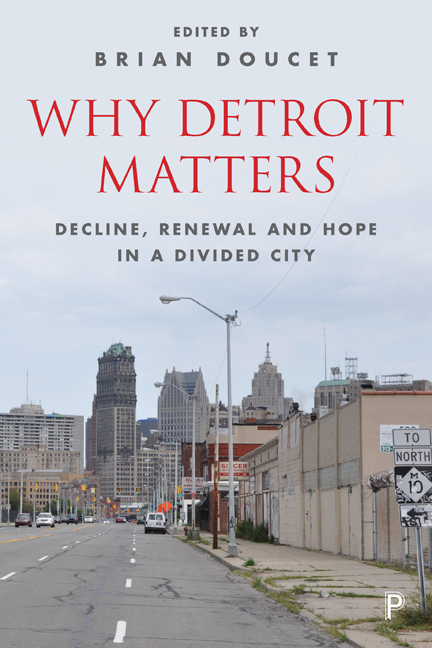Book contents
- Frontmatter
- Contents
- List of contributors
- List of figures and tables
- Acknowledgments
- one Introduction: why Detroit matters
- Section One Lessons from Detroit
- Intermezzo I You may not know my Detroit
- Section Two Practices from Detroit
- Intermezzo II My Detroit
- Section Three Conversations from Detroit
- References
- Index
twenty - Avalon International Breads
Published online by Cambridge University Press: 05 April 2022
- Frontmatter
- Contents
- List of contributors
- List of figures and tables
- Acknowledgments
- one Introduction: why Detroit matters
- Section One Lessons from Detroit
- Intermezzo I You may not know my Detroit
- Section Two Practices from Detroit
- Intermezzo II My Detroit
- Section Three Conversations from Detroit
- References
- Index
Summary
When Jackie Victor and her then partner, Ann Perrault, opened Avalon International Breads on Willis Street in June 1997, they challenged the narrative that Detroit was closed for business. They were one of the first new businesses to open in Midtown and the success of their bakery helped to change the narratives about Detroit.
However, Avalon operates from a distinct business philosophy, which focuses on a triple bottom line of earth, community, and employees. They have offered a living wage and health benefits to their employees, 90% of whom live in the City of Detroit. While both Jackie and Ann grew up in Metro Detroit, they have lived in the city since 1990 and 1980, respectively.
Jackie and Ann were friends with Grace and Jimmy Boggs (see Chapter Twenty-five), and Grace's philosophy, inspired by Hegel, of understanding the contradictions that emerge when new solutions are found is evident in Avalon's relationship with the city and with Midtown. Avalon, a triple-bottom-line business founded by two activists, has been a catalyst for gentrification. While Jackie is incredibly proud of how her business helped to midwife the changes taking place in Midtown, she is careful to remind anyone that this, in turn, creates its own contradictions and that we should not be under the illusion that everything in Detroit is getting better, especially beyond the narrow confines of The 7.2. However, the experience of Avalon and the philosophy of its co-founder offer some insightful visions as to ways in which a more inclusive Detroit can be built.
You grew up in the suburbs of Detroit. What was your relationship with the city?
My grandfather emigrated from Russia and opened a small department store in what was then Hastings Street, in Paradise Valley. At that time, Hastings Street was a thriving community. So I grew up with these idyllic stories of Detroit. My parents moved out to Bloomfield Hills when I was one. When my grandfather saw their house for the first time, he cried and said “Who would have through that an immigrant like me, with no education, could come here and that his son would have this?” My father was an attorney working in the Guardian Building Downtown. My mom was a classical musician, so we would see concerts Downtown.
- Type
- Chapter
- Information
- Why Detroit MattersDecline, Renewal and Hope in a Divided City, pp. 303 - 310Publisher: Bristol University PressPrint publication year: 2017



